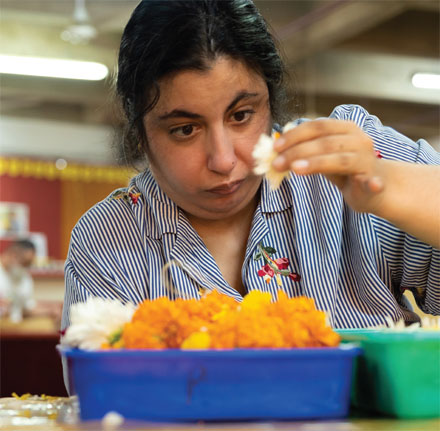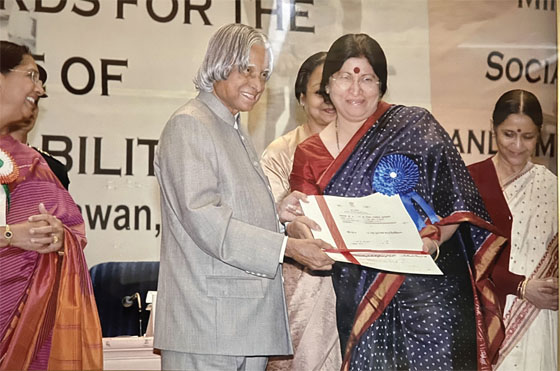Muskaan, founded by Shanti Auluck, is an inspiring story of a mother driven by the simple understanding that all lives are equal and all have the right to live a full life with dignity. A zealous champion against social injustices, especially for those with Intellectual Disability (ID) started Muskaan 41 years ago. The Centre, headquartered in Vasant Kunj, New Delhi does impressive and essential work in training adults with learning disabilities to build comprehensive life-skills and vocation skills and thereby earn a living and life with self-respect. She exudes warmth and passion as she speaks of the students at the Centre who are all equally special and close to her heart.
In conversation with
PRIYAANKA BERRY IDNANI

Just to begin and introduce everyone to what got you motivated to start the Welfare association for Down Syndrome 1982, which is today Muskaan?
It has been a personal journey. I had my son, Puneet in 1976 and realized within a few days that he had Down Syndrome. Over the next couple of years, I experienced the challenges and demands that came with it.
Soon, it become very clear that I have to move my perspective to a more solution-oriented approach. I started to learn from my son and observe him and those around. It was extremely unsettling to see the insensitivity from certain sections in our society. My primary thought and motivation became that my son must get the respect and life he deserves.
“We owe it to the children with intellectual disability and their families, and we must work to create opportunities so that they can live a decent and respectful life”. The Welfare association for Down Syndrome began with parents wanting the same for their children and professionals wanting to make a difference.
My background in Psychology also helped me here. I was able to adapt and modify learning techniques and apply ways to impart cognitive training. We had no model or processes available to follow. We started with small experiments and allowed the children to guide us along the way. Today, the processes have been documented in detail and that is critical work done.
I saw a very impressive book celebrating 40 years of Muskaan and clearly it has been a journey of learning and accomplishments. What would you say have been your landmark achievements?
What does stand out is in 1989 we started our vocational training centre, in the name of Muskaan. The goal here has been to impart simple vocational skills and prepare them for a life of work and employment, thus giving them a feeling of pride and purpose and community.
The success we saw inspired us to grow and take on more students. We started off in a garage. I did not like the cramped space where our students, teachers and volunteers worked. It was important to have a proper facility and infrastructure for not only the students but also the faculty. These are very special people who opt to work here.
We approached Delhi Development Authority for the allotment of land in 1994. Today, Muskaan operates from an acre of land in Vasant Kunj and my husband, Santosh Auluck, who is an architect, and his friends helped plan and build this. The community of friends and supporters of Muskaan helped make it a reality.
We decided on working with students of age 16+ as little exists for them. The training centre also looks at life-skill training and personal growth-oriented programme. This includes training activities for cognitive enhancement, social-emotional understanding, independence in daily life, and knowledge of physical and social environment. We also have a Supported Work Centre that gives employment to our students where they make a wide-range of products, then sold through various channels. We also have physical therapy, computer skills class and a sports and recreational facility. We also have an Assisted Living Facility, where people with ID live and work at the Muskaan centre in Vasant Kunj.

You believe there are diverse ways of being in this world and each one is valid and authentic. Can you elaborate on how we as a society can work towards social inclusion?
The most important is to have the presence of those with intellectual disability around you and society. If we interact more and see those with ID around us, automatically our awareness and knowledge of their abilities will increase and lead to greater social inclusion and respect. Parents must also work to overcome their own sense of stigma of having a child with ID.
“Life is a gift, and everyone enjoys it in one’s own unique way. There are diverse ways of being in this world and each is valid and authentic. What ultimately matters is that everyone should be treated with love and respect and get opportunity for a full life as much as possible. That is social inclusion.”
How is Muskaan working at advocacy with the Government and other stakeholders to create adequate, appropriate and quality services and facilities for people?
We realized that misconceptions and prejudices inbuilt in society was a huge limiting factor. Many believe that ‘impoverishment’ of their lives arose from their disability whereas the truth is that it was the lack of needed facilities. There is an attitude of charity and lack of knowledge on the way forward. Muskaan is an active advocate for social awakening for the rights of people with disabilities.
Time has shown that many adults with Intellectual Disability, with training and support, can find employment in the real world. Are you seeing a greater awareness and open mindedness today?
Yes absolutely. Hospitality is a sector we are seeing showing good uptake and open-mindedness. Lemon Tree Hotels, RedFox, The Lodhi, Radisson, Four Points Sheraton and other partners are offering avenues for employment for our students. The more you see and interact with people with ID in your daily life, the more you realize that they too are capable for mainstream employment and this leads to greater awareness, sensitivity and respect. They are hard-working, honest, sincere and passionate about their work and often receive high praise from employers and other team members.
What are your next goals for Muskaan?
First, more advocacy with the government and thereby create and help on policy assessment and formulation. There is an immense need for more facilities and services being made available to those with intellectual and developmental disabilities.
Second, we want to work on group houses. Not everyone has the option to live with their parents/family. Here 4-6 senior adults with ID would live together as an extended family assisted by family members and professionals and assistants. Muskaan would take the role of monitoring, supervisory and training.
Lastly, we want to start work on a teachers’ training centre. The team here has vast experience and knowledge and can impart much value in working with and understanding those with ID.
Reach Muskaan: Supporting their Initiative and How?
Support the cause by donating, volunteering or simply shop their products. These products are made with care by the men and women employed at the Supported Work Centre of Muskaan. Each has necessary certification and go through quality checks. These include daily use spices ‘masalas’, flour, candles, gift bags, baked good, pickles and more.
To know more visit www.Muskaan-paepid.org.
ABOUT MUSKAAN
Muskaan creates and provides opportunities for capacity development of people with Intellectual Disability and their families, advocates for their rights and legal capacity, collaborating, facilitating and promoting the creation of an enabling environment and an inclusive society.